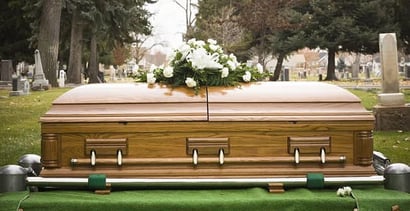

Dying with significant debt is worse than living with significant debt. When lawyers start showing up, it puts an emotional strain on loved ones already in a fragile state of mourning.
However, there are a series of steps you can take to give yourself and your loved ones some emotional and financial closure.
1. You’ll need a lawyer
Resolving a deceased person’s debt is more a legal issue than a financial one, so you should first contact a consumer law attorney. The law concerning liability for debts after death is very complicated and depends on the ownership of the debt and what state the deceased called home.
When you die, the transfer of your worldly possessions happens in one of two ways: probate and by operation of law.
Property which goes through probate is considered your estate.
Property transferred by operation of law goes directly to the intended recipients and is not part of your estate (this includes life insurance policy money.)
2. Debt (usually) dies with the deceased

If you know it’s coming, why not prepare for it?
Generally debt is not inherited or passed down to survivors and beneficiaries. However, this depends on who owned the debt.
If the deceased alone owned the debt (credit card in his/her name), the debt is handled by the estate.
If the debt is jointly owned or if it is guaranteed by another party, creditors can pursue repayment from others.
Of course, there are many legal exceptions. For example, don’t spend any estate money before the debts are paid and do not use the deceased person’s credit card after the death.
3. Executors/administrators handle who gets paid first
The executor (when there’s a will) or the administrator (when there’s no will) is responsible for first paying off the debts (and no doubt paying the lawyers).
Then this person in charge of estate distribution divides the remaining assets as outlined in the will and/or written into state law.
The estate will be either solvent (enough money to cover debts) or insolvent (insufficient funds to pay all the debts), in which case the executor/administrator must use federal and state law to determine how much each creditor will receive.
Remember debts and funeral expenses must be paid first.
4. Assets are fair game during debt resolution
Everything the deceased person owned — whether’s it cash, cars or cigars — becomes subject to liquidity in the debt resolution process if their bank account doesn’t have enough to pay what creditors are owed.
This means anything of value, including seemingly-priceless family heirlooms, can be fodder for debt resolution.
5. You may be held liable if married in certain states
 If you were married in Alaska, California, Idaho, Louisiana, Nevada, New Mexico, Texas, Washington or Wisconsin — states with community property laws — you may be subject to certain debt collection measures if you and your deceased spouse acquired property/assets after you tied the knot.
If you were married in Alaska, California, Idaho, Louisiana, Nevada, New Mexico, Texas, Washington or Wisconsin — states with community property laws — you may be subject to certain debt collection measures if you and your deceased spouse acquired property/assets after you tied the knot.
However, no two states have the same community property laws, so be sure to contact an estate planning attorney in your area.
Keep in mind anything you yourself acquired before the marriage won’t be included in the debt resolution process.
6. Creditors need to see a death certificate
If a relative dies with credit card debt, cut up the cards and send them to the issuer with a death certificate. Then contact the three credit reporting bureaus, inform them of the date of death and ask them to close each credit profile.
My recommendation — don’t die owing more money than you have. A better plan would be to start paying off your debt before you die.
Check your credit reports for free, list your debts, contact each creditor and negotiate a payback plan.
If you need assistance, contact an approved credit counseling agency. Make sure your loved ones have a list of your assets and a directory of where the debts are.
Life is short, but you do have time to pay off your debts.
Photo credits: independent.co.uk, Wikimedia Commons
Advertiser Disclosure
BadCredit.org is a free online resource that offers valuable content and comparison services to users. To keep this resource 100% free for users, we receive advertising compensation from the financial products listed on this page. Along with key review factors, this compensation may impact how and where products appear on the page (including, for example, the order in which they appear). BadCredit.org does not include listings for all financial products.
Our Editorial Review Policy
Our site is committed to publishing independent, accurate content guided by strict editorial guidelines. Before articles and reviews are published on our site, they undergo a thorough review process performed by a team of independent editors and subject-matter experts to ensure the content’s accuracy, timeliness, and impartiality. Our editorial team is separate and independent of our site’s advertisers, and the opinions they express on our site are their own. To read more about our team members and their editorial backgrounds, please visit our site’s About page.




